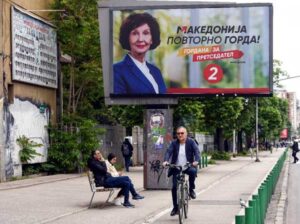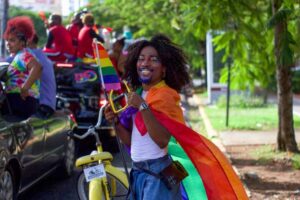
Armed Conflicts, Civil Society, Global Governance, Headlines, Human Rights, IPS UN: Inside the Glasshouse, Middle East & North Africa, TerraViva United Nations
In an interview with Herta Däubler-Gmelin who served as Federal Minister of Justice from 1998 to 2002, and as a Member of the German Bundestag from 1972 to 2009.

– The chief prosecutor of the International Criminal Court (ICC), Karim Khan, last week requested arrest warrants for three Hamas leaders as well as for Israeli Prime Minister Benjamin Netanyahu and his Defence Minister Yoav Galant. They are accused of various war crimes and crimes against humanity. But what does this mean and where do things go from here?
This is a very significant first step towards being able to bring political and military leaders to court for the most serious crimes against humanity. For some time now, the office of the chief prosecutor of the International Criminal Court has also been conducting investigations in Israel and Gaza with the support of highly qualified external experts in international law.
Brenda J. Hollis, an exceptional US lawyer with extensive military experience, is leading the investigations at the chief prosecutor’s office. And, also in this case, she is just as qualified as in the investigation against Vladimir Putin, which led to an arrest warrant from the court.
The chief prosecutor has forwarded the results of his investigation to the competent judicial preliminary chamber of the International Criminal Court. This is staffed by judges who carefully examine all the evidence submitted and then assess it in full independence and in accordance with the applicable criminal law before deciding whether to issue an arrest warrant.
The procedure is therefore the same as the one used for the arrest warrant against the Russian president. But why is the International Criminal Court needed? Isn’t the Israeli judiciary responsible for a possible trial?
Of course, the jurisdiction of the International Criminal Court must be clarified. In this case, this includes whether – if the terrible allegations of crime are confirmed – the Israeli prime minister and his defence minister would also be charged before Israeli courts and convicted by them. This is not entirely out of the question, despite Netanyahu’s attempts to strengthen his political power by weakening the judiciary.
We all remember the huge demonstrations by courageous Israeli citizens against these plans. To this day, the ‘battle for the rule of law and the separation of powers’ in Israel is not yet over. All of this will have to be recognised and evaluated by the judges of the competent preliminary chamber.
The chief prosecutor’s request concerns the leadership of Hamas as well as the leadership of Israel. Does this not lead to an inappropriate equation between those who are members of an EU terror-listed organisation and elected representatives of a democratic government?
The claim of equivalence is an inaccurate, political accusation — and the International Criminal Court is not concerned with politics. It is verifiably about international law. Everyone – including government statements – should take this into account, unless they want to weaken the International Criminal Court.
The chief prosecutor has, of course, submitted different applications with various justifications relating to different facts and allegations of crimes. In these, there is no recognisable legal equivalence between the leaders of Hamas, in other words a highly organised non-state terrorist group, and the elected officials of Israel.
Some commentators evidently take the view that only terrorists can commit the most serious crimes against humanity, but not democratically elected officials. Unfortunately, numerous examples from the recent past show that this is not the case.
As Germany recognises the International Criminal Court, Netanyahu and Galant would theoretically have to be arrested upon entering the country if they were charged. How realistic do you think this is?
Anyone wanted by the International Criminal Court on the basis of an arrest warrant must be arrested if they enter a member state, because the Rome Statute clearly stipulates that arrest warrants must be executed by the member states. Of course, not every government that is pursuing its own political agenda likes this.
As we all know, the Chinese government’s criticism of the International Criminal Court’s arrest warrant against Putin and its demand for his immunity on the grounds that he is a public official were met with astonishment. However, there can be no special status for public officials.
The Rome Statute rules this out and we in Germany – as well as around two thirds of UN member states – should recognise and support the independent International Criminal Court with good reason.
As a constitutional democracy, we should also be wary of double standards. On the contrary, we should help to dispel the suspicions fuelled by political interests about the qualifications, integrity and independence of the International Criminal Court, the chief prosecutor and the judges.
The International Criminal Court has frequently demonstrated its high level of qualification and its necessity. It is infuriating that the US, Russia, but also China and India, among others, acknowledge the Court as a ‘court for others, but not for themselves’.
This weakens international law, on which we Germans particularly rely. As is well known, the International Criminal Court has already recognised its jurisdiction to prosecute crimes against humanity in Palestine and Gaza in 2021 following multiple resolutions and recommendations by the UN General Assembly.
The International Criminal Court is based on the Rome Statute of 1998, which was adopted during your time as minister of justice and against immense pressure from the US. What impact would a disregard of the proceedings by Germany and other signatory states have on the international legal system?
It is indeed a great disappointment, even a nuisance, that states such as the US are evading membership and downright fighting the International Criminal Court. Especially as very good US lawyers work in the office of the chief prosecutor.
I would like to repeat: strengthening international law and supporting the International Criminal Court go hand in hand. In Germany, we have not only ratified the Rome Statute, but have also created the German International Criminal Code, which today, in accordance with the Rome Statute, relieves the International Criminal Court in appropriate proceedings. We rely on international law and should continue to do so. And this support has to prove itself time and again.
The fight against the most serious crimes against humanity is more important today than ever before. It is also high time to assign the prohibition of aggressive war to the jurisdiction of the International Criminal Court in its entirety, even if ‘only’ the invaded state, but not the aggressor itself, is a member state of the International Criminal Court.
Source: International Politics and Society (IPS)-Journal published by the International Political Analysis Unit of the Friedrich-Ebert-Stiftung, Hiroshimastrasse 28, D-10785 Berlin
IPS UN Bureau










